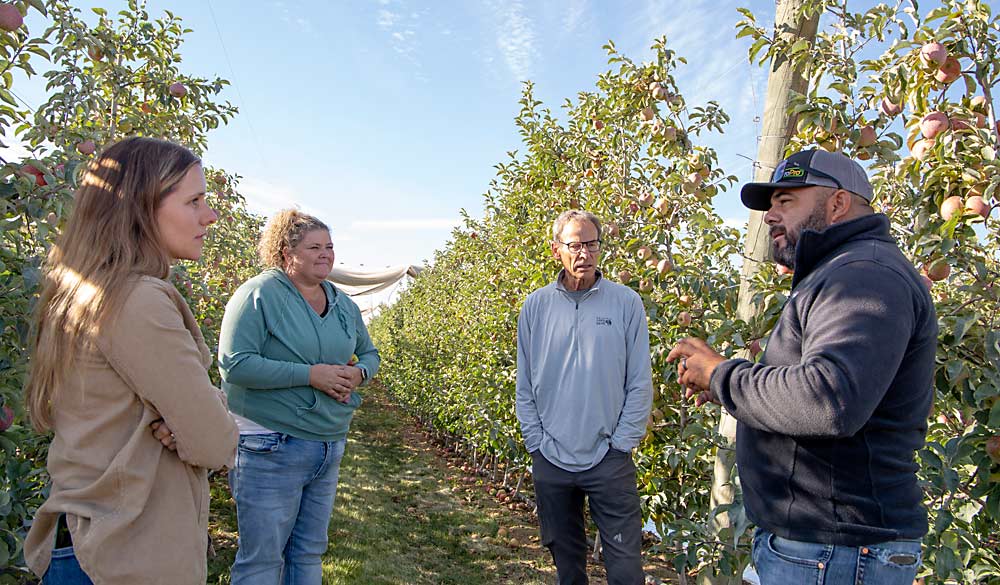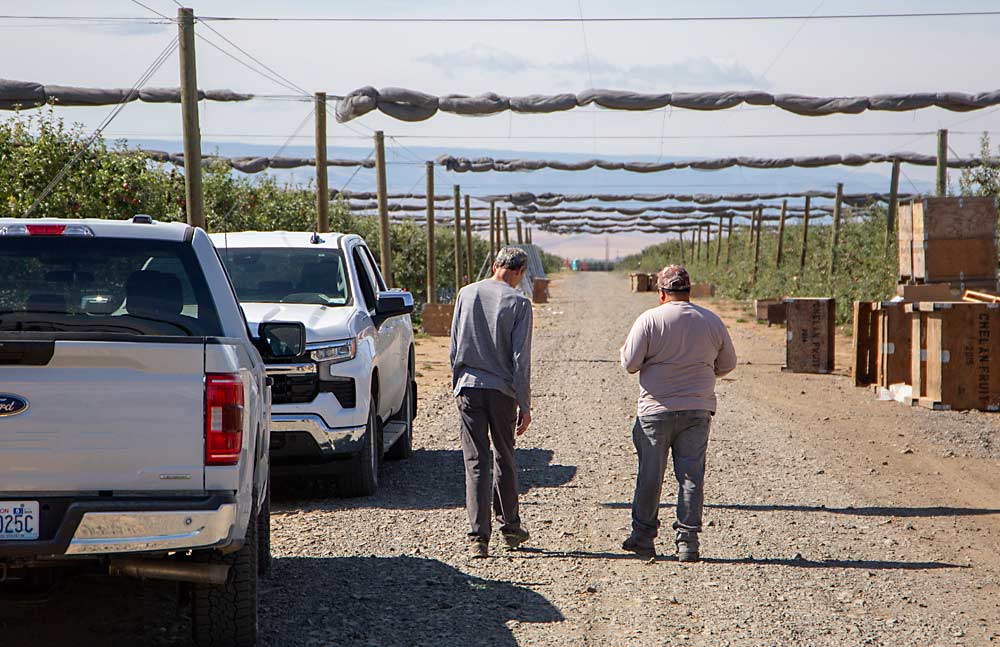—story and photos by Ross Courtney

The career that earned Tom Gausman the title of Good Fruit Grower’s 2024 Grower of the Year did not exist when he was a farm boy. Back then, if an orchard had a manager, it was likely an employee hired by the family as Mom and Dad aged.
However, the rise of outside investment in Washington tree fruit has necessitated a rise in professionals like Gausman, co-founder and outgoing vice president of AgriMACS of Chelan, which manages orchards for Homestead Capital, International Farming, Sixth Street and other equity groups.
Over the years, Gausman and his contemporaries have redefined the business.
“He’s the modern-day grower,” said Mike Grubbs, director of business development for Columbia Farm Services, and also a 45-year friend. “He’s not a farmer out here with 30 acres in Chelan or a pear grower in Peshastin, but he still loves the industry.”
Outside investor owners and management companies existed when Gausman and his partner, Tim McLaughlin, founded AgriMACS in 2000, but the situation was rare and flew under the radar. As companies consolidated, Northwest orchards became more attractive to outside capital, a trend that ramped up significantly in 2016.
That’s when Grubbs and Gausman worked together to build large orchards under tight deadlines for International Farming, or IF. At the time, Grubbs worked for Chelan Fruit, the cooperative that IF would eventually purchase.
Several factors lined up for “a perfect storm” of investment, said Scott Porter of Cascadia Capital, a Seattle-based firm experienced in agricultural mergers and acquisitions. Interest rates were low, swaths of the Columbia Basin began aging out of Bureau of Reclamation acreage limits, tree fruit came off several banner years, and agriculture offered the perception of steady, slow growth in contrast to the topsy-turvy housing market of the Great Recession.
“People buy into the thesis of ‘Everyone needs to eat,’” Porter said.
However, just because investors own a farm doesn’t mean they know how to grow anything.
“Ag, more than anything, is dependent on good managers,” Porter said.

Management skills
All of this required adjustment from Gausman, a self-described introvert.
He has worked with investors and their representatives, other company officers, area managers, orchard managers, assistant orchard managers and crew supervisors. He has learned diplomacy, negotiation and how to navigate the chain of command.
Gausman has come to enjoy the non-horticultural parts of his job, he said, such as discussing plans over a pint of cider and finding compromises between managers and clients. For example, the owners of one orchard near Ephrata wanted only organic Honeycrisp, despite AgriMACS warning them of labor challenges. To this company’s credit, the investors promised to build housing for more H-2A workers to pick all those Honeycrisp in the optimum harvest window but are waiting until economic conditions improve.
Also, scale required more employees and, therefore, soft leadership skills. He and McLaughlin foster a company culture of empowering managers below them, they said. Gausman intentionally keeps his distance from crews, to avoid subverting authority, and he tries to recommend changes instead of mandating them.
Jimmy Bautista, who manages two AgriMACS orchards near Brewster, has noticed. He said he had many bad bosses over the years at wood mills, medical offices and farms — bosses who were harsh and inflexible. He always swore off management because he didn’t want to be that way.
In 2022, when investors bought an orchard managed by his father, Fernando, AgriMACS took over. Bautista noticed the collaborative spirt and agreed when the company offered him a job.
When a problem emerges, higher-level managers ask for his opinion, suggest other experts and research solutions with him, he said. Other AgriMACS workers tell similar stories, he said.
“Just the team play of the job is really what I enjoy,” Bautista said. •







Tom is most deserved of this award. He has demonstrated the value of the position he holds through this recognition. Salute.